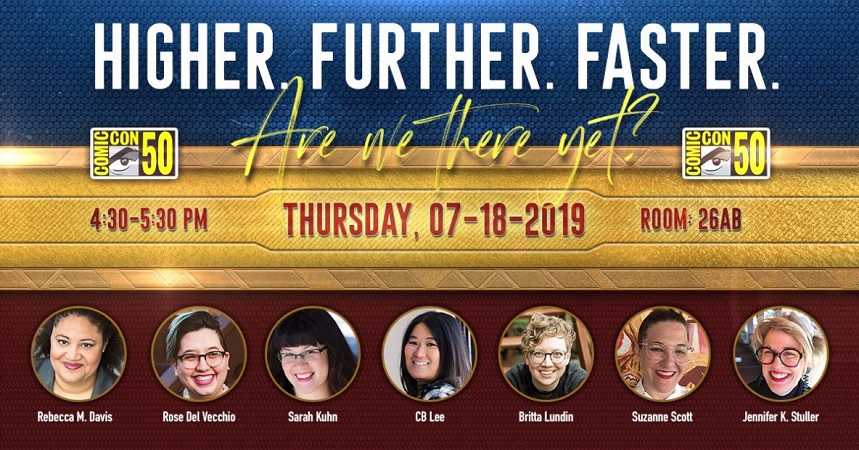SDCC 2019: Higher, Further, Faster: Are We There Yet?
The team at FANgirl has many great memories from GeekGirlCon conventions over the past decade, including panels we’ve hosted and attended and the friends we’ve made there. So when we saw our friend Jennifer K. Stuller had organized a San Diego Comic-Con panel with a title inspired by Captain Marvel and centered on the ongoing struggles of female fans, we made sure to be there. Unfortunately, Stuller herself was unable to participate at the last minute due to a family emergency, but the panel she created provided a thoughtful and inspiring discussion for everyone in attendance.
Moderator Suzanne Scott is a professor in the Radio Film and Television department at the University of Texas at Austin who specializes in fan studies and geek culture. Her newly published book Fake Geek Girls considers the role of women in geek culture from a variety of angles; her next book project considers the fan body. She began the panel with what she joked is the panel’s own origin story: the fraught role of women in geek culture despite their longstanding presence in fandom circles, not only in creative endeavors but also as consumers and activists. Scott noted that Comic-Con has seen a huge boom in panels about women over the past decade, but posed the question whether the celebratory discourse elides a more complicated reality, especially with the persistence of gatekeeping. She then posed a question for each panelist in turn, allowing them to elaborate on a topic of importance to them.
In 2010, a panel titled “Geek Girls Exist” packed room 8 at Comic-Con, serving as a refutation of the negative perceptions swirling in geek culture at that time. Sarah Kuhn, author of the Heroine Complex series and other works, was a panelist on that panel and has seen much improvement in media and fandom since then. While toxicity remains, Kuhn used to feel that she always had to be ready to defend her presence in geek culture – and now, like Carol at the end of Captain Marvel, she knows she has nothing to prove. Women have always been here and belonged here. Kuhn also noted the importance in continuing the fight for representation for everyone. While the fight began with a united mission to prove than any women belong, the progress that has been made is not enough. As Kuhn put it, having a female Doctor should not mean we’re done. We should continue the fight until everyone gets their moment of seeing someone who looks like them as the Doctor, or Rey with the lightsaber, or Captain Marvel. Scott added that the history of geek culture shows that women of color often spearhead a push for change but do not receive the credit, or the benefits, when change happens.
In 2016, The CW network’s The 100 faced a huge online backlash after the consummation of the Clexa ‘ship promptly resulted in Lexa’s death, repeating the well-known and harmful “bury your gays” trope. Scott asked Britta Lundin if fan activism makes a difference, and whether large corporate entities are even paying attention. Lundin started on the fan side, and since has written professionally for The CW’s Riverdale and other projects, as well as her novel Ship It. She acknowledged that fans sometimes feel that their tweets and critiques are shouted into the void, and sometimes they are. But when a critical mass of reaction emerges, companies notice. The Clexa debacle showed that fans are concerned not just about the fate of their favorite ‘ships, but about raising awareness of broader trends in entertainment. Since then, Lundin has been in the room when executives have asked whether “bury your gays” is something they need to be worried about. Whether they want to avoid the trope because it’s the right thing to do or simply to avoid a public relations crisis, either way the trope is prevented – meaning that the attention generated by the Clexa backlash is working.

At Comic-Con in 2018, fans on short notice arranged a “Rally for Rose” to show support for actress Kelly Marie Tran, who recently had left social media after receiving a barrage of hateful and toxic interaction in the months after the release of The Last Jedi. Author C.B. Lee, whose Not Your series deliberately puts characters from marginalized backgrounds into the center of the story rather than as sidekicks or villains, started her Rose cosplay two days before SDCC so she could join the rally. She noted that Tran faced not only the stark vitriol, but also constant micro-aggressions stacking up, which has a significant emotional impact, too. Lee described the diversity in the Star Wars Sequel Trilogy as fulfilling and validating: seeing someone who looks like you in Star Wars is inspiring to want to be more, and seeing people of color in the future gives them power in the present. The presence of those characters also builds empathy from others, too.
Rebecca Davis is a prominent member of Seattle’s nerdlesque (nerd burlesque) community. Scott noted that fan studies scholars have recognized for many years that women and people from marginalized groups participate in fandom by finding spaces for themselves. Davis agreed that nerdlesque is a way of performing your fandom, and accordingly accomplishes many of the same things as other types of transformative works. Like fanfiction, for example, a nerdlesque performance might take an element of the official story and “fix it” to the performer’s liking, go into much greater depth than the original source, or center a side character. One memorable performance Davis recalled featured Cho Chang from the Harry Potter series, with over-exaggerated crying throughout the nerdlesque performance to evocatively call out the sense that in the books all the character gets to do is cry. Davis emphasized that nerdlesque is not about portraying the characters as depicted in the original material, but instead using homage, satire, and humor to comment on it.
Rose Del Vecchio was attending her 14th Comic-Con this year, and explained how working for her father’s small business at the convention over that span showed her that eighty percent of his business there came from women. Nonetheless, she saw that mainstream sources still fail to serve those consumers, so she created FanMail to provide curated subscription boxes to give women a sense of what is out there for them. After four years, FanMail has supported over 120 small businesses in getting their products in front of interested consumers.
Scott then asked the panelists whether it is time to put the fake geek girl myth to rest. Davis said that unfortunately we have to keep talking about it because it still persists, and she called on allies to stand up against toxicity as well, so that marginalized fans do not have to bear all the emotional labor. Lee emphasized that the spirit of fandom is to be inclusive, and if you are passionate about something then you can share in that fandom. Lundin would prefer to be done talking about it, but agreed in the importance of modeling good behavior and being the change you want to see. She also noted that each person has to set their own balance of when to call out and when to ignore, because it can ruin your day to fight back against toxicity even if it is rewarding to help others by doing so. Kuhn expressed hope that the next step is activating the vast nerd girl community to effect change. The more women can share their fandom with each other and support each other, the less they will feel the need to prove anything to the boys.
Concluding the panel, Scott asked what advice each panelist would give to the next generation of geek girls. Del Vecchio shared the advice from Robin Warren of Geek Girl Strong, that as you go through the door, extend a hand and bring someone with you. Lee urged to never stop asking if we’re there yet, and to ensure that we uplift all boats as the tide of inclusion rises. Davis advocated lauding the good and calling out the not good, especially so that tiny geeks are shown that they belong and what good behavior in fandom looks like. Lundin pointed out that now the industry offers way more television programming than anyone could possibly watch, which means fans no longer have to watch what they don’t like – so instead of watching shows you think are important or that you’re supposed to watch, instead yell about the shows you’re truly excited about. Kuhn added that taking up space in fandom makes women visible and vocal, and to live your passion even if only a few people you know share it with you today.
Higher, Further, Faster: Are We There Yet?
Female superheroes are finally getting their due on screen and reigning at the box office. Star Wars now centers on a female Jedi, Black Panther brought a dynamic array of female characters to the MCU, and there is the first female Doctor since the character’s 1963 debut. Women-owned companies like Jordandené and subscription boxes like FanMail provide female-fan-forward fashion and merchandising opportunities that didn’t exist a decade ago. Online commentary from sites like SYFYFangrrls, fangirl-run podcasts, and events like GeekGirlCon continue to successfully challenge the notion that fandom is a male-dominated space. So why are women still having to prove themselves as consumers and community members, as well as pop culture enthusiasts and producers? Why has the “fake geek girl” myth persisted? Join Jennifer K. Stuller (Ink-Stained Amazon; co-founder GeekGirlCon), Suzanne Scott (UT Austin, Fake Geek Girls), Sarah Kuhn (Heroine Complex, Shadow of the Batgirl), Britta Lundin (Ship It, Riverdale), Rose Del Vecchio (FanMail), and Rebecca M. Davis (NW POC Geeks; Nerdlesque MC; GeekGirlCon), and C. B. Lee (Not Your Sidekick; Not Your Villain) as they punch holes in the sky for a dynamic, inquisitive, compassionate, community-building discussion exploring how far they’ve come culturally as female fans, struggles they still face as cultural critics and culture makers—and ways for us all to go higher, further, and much much faster.
- BJ Priester Talks The Acolyte Episode 6 on Who’s the Bossk? - July 7, 2024
- Dave Filoni Talks Writing AHSOKA and Guiding the Future of Star Wars Storytelling - June 21, 2024
- Lessons in Franchise Management – MCU: The Reign of Marvel Studios - January 14, 2024











